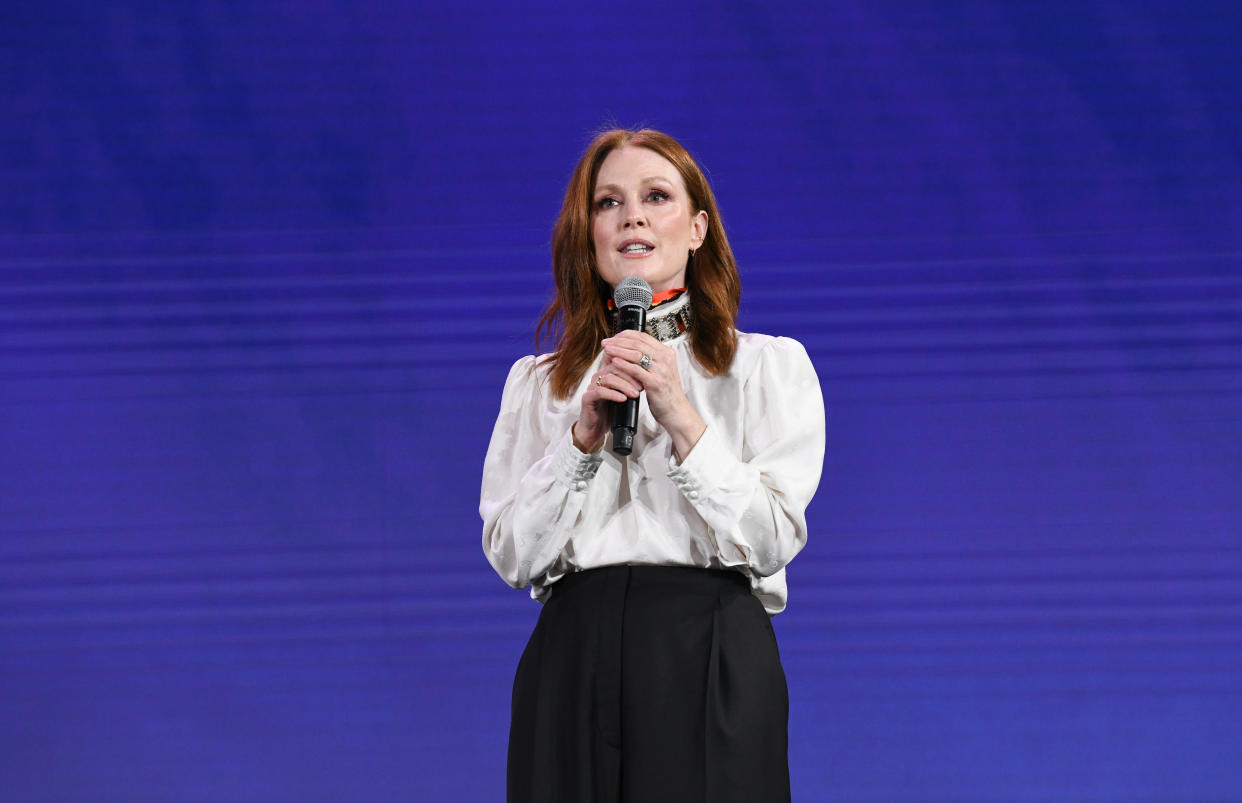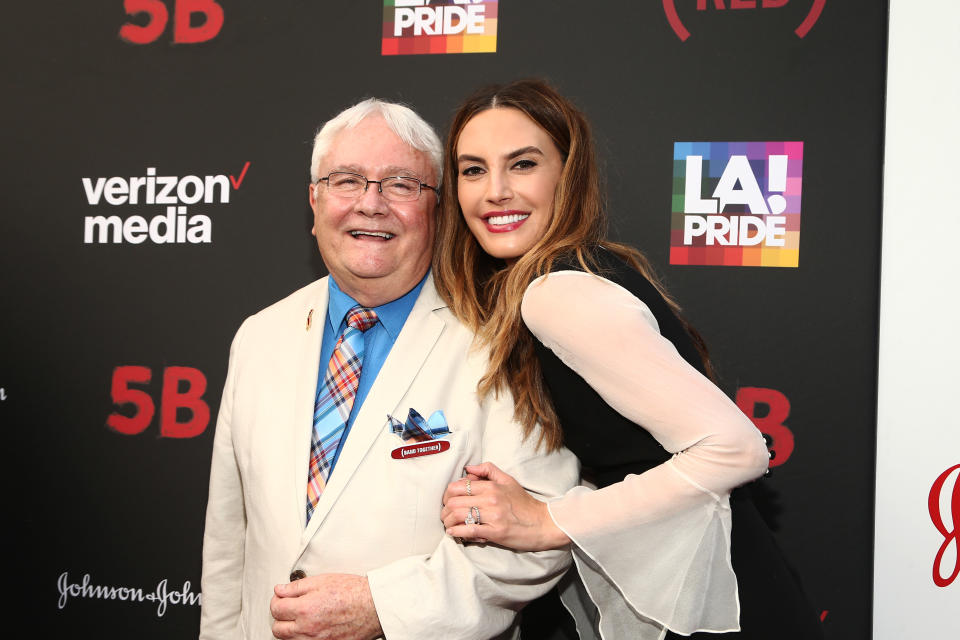Julianne Moore talks AIDS activism and the eye-opening documentary '5B'

Once in a while, a movie makes you want to be a better person. 5B, which tells the story of the first dedicated AIDS ward in the United States, is one of them. Paul Haggis and Dan Krauss’s documentary pulls audiences into the early years of the epidemic, when HIV-AIDS (initially referred to as “gay cancer”) was a deadly mystery that terrified medical professionals and the gay community alike. In the early ‘80s, doctors would wear hazmat suits and gloves to treat AIDS patients, orderlies would refuse to deliver their food and hospitals would quarantine them far from other patients. This dehumanizing treatment infuriated San Francisco General nurse Cliff Morrison, who recruited a group of likeminded nurses from around the country to build Ward 5B. With the hospital’s blessing and in the face of backlash, 5B nurses cared for their AIDS patients (double stigmatized because of their homosexuality) as human beings, touching them with bare hands, opening family visitation rights to their partners and making sure they did not die alone.
The incredible courage and compassion of these nurses, told in 5B through their own words, is just as inspiring today as it was in 1983. Among those who were moved by the film: Oscar winner Julianne Moore, who saw AIDS decimate her own community when she was a young actress in 1980s New York City. Moore, who has been supporting the film at the festival circuit and media events (5B is presented by RYOT, a Verizon Media company), teamed up with Morrison to speak with Yahoo Entertainment about activism, fighting for human rights and where to find hope for the future.
Yahoo Entertainment: Julianne, you've been very outspoken always, but particularly in the Trump era, about gun violence, about sexual assault, about the injustices faced by women. You're the only person I've ever heard say that actresses are hungry all the time.
Julianne Moore: Ha! That was a long time ago. It was a very kind of flip comment, you know?
But I love that you are not afraid to speak truth to power. Why do you think other people who are in the public eye are afraid to speak out about these issues?
Moore: I don't know. I can't speak for anybody else. It’s funny, because a young actor recently asked me about the role of actors and activism, and whether there’s some sort of interplay. And I said no, obviously no. Being an actor is one thing and being an activist, I really think, is about being a citizen. I think we have to take responsibility for our community. And what's great about living in the United States is that we can. We have freedom of speech here. We can say, this is not right, this is what I believe. That’s what I try to say to my children: This is a personal responsibility.

Cliff, when you created Ward 5B, the cause of AIDS still wasn't known. The nurses in the film talk about signing on, knowing that they were at risk for contracting this disease that initially had a 100 percent fatality rate. What helped you and the other nurses get over that fear?
Cliff Morrison: I can speak for myself, but I think to some degree I can speak for them, because I did bring them on. I hired them because of who they were and where they were coming from at that point in time. It was all about the fact that we were professional providers, we went into a profession that said that you don't look at your patients as being different and separate, and that you love everyone, and that you care for everyone. And it's universal. To me, at the time maybe it seemed naive, but there just wasn't a question. This [treatment of AIDS patients] is not right. This is not what we're supposed to be doing. And I just wanted to change that.
You both experienced the AIDS era. I think it's hard for those who weren’t there to comprehend the degree to which we lost a generation of people, of artists, in just a few years. Is that something that either of you talk about with younger people?
Moore: I do with my kids, yeah. When I moved to New York in 1983, I was 22, I’d just graduated from college. And very quickly in the ‘80s, you watched all of these young people become ill and die very quickly. And it was scary. It was really scary, and it felt dangerous. And so I’ve mentioned it to my kids just to say, “Hey, this was something that it seems like it was a long time ago, but it wasn't.” And as Cliff has pointed out, AIDS still exists. We may have dealt with it more successfully in the in the U.S., but in countries all over the world, people are still struggling.

5B speaks to a question that's still very relevant now, which is, how do we help people to see those who are different from them as human beings who are worthy of care?
Morrison: I think you have to play on people's basic inner instincts, and focus on what we have in common and what's not different about us. And when you start looking at it that way, you see that there's not a lot of differences. And then also, look at the lessons we've already learned. We've had these wonderful opportunities within our lifetime with civil rights. We've come so far. And then all of a sudden, you turn around and you see all of this divisiveness and hatred and bigotry. We have to change all of that. And so I'm hoping that will be one of the messages of this film.
Moore: I think Cliff is exactly right. When you view someone as “other,” then they're not quite human to you. In my community, the people who were primarily being affected by HIV and AIDS, were people that we were working with. They were our peers. They were our colleagues. So I think when you're in a situation where that person is your friend, you have an opportunity then to say to everybody else, “Hey, this person is deserving of care and love and attention and compassion.” The reason I love this film is because it demonstrates that so beautifully. And this is a time when people really didn't know what this disease was, and what the ramifications were. And these individuals in 5B stepped up and really set an example for everybody else.

Cliff, what can people who see 5B do to continue the work that you began in 1983?
Morrison: I think just being informed, paying attention to what's going on around us, having an opinion, not just accepting what someone is saying to you. Let's question things. Let’s look at access to care. I mean, I think healthcare is still as big an issue, or bigger now, than it was in 1983. So let's make it an even bigger issue.
Moore: With activism, it's really important to find the thing that speaks to you. As Cliff says, if you're informed, if you're paying attention, you can see where people's rights are being infringed on and really speak out about it.

It's so easy to feel hopeless in our current political climate. Where do you find hope?
Morrison: For me, I find hope in people. I really, truly believe in the American spirit. And I think it's still there; I think that sometimes we just have to pick at it a little bit. But it's there. We're Americans, we've always been innovative, we've always moved forward. And we're very progressive, and I just have faith in where the American people will go in the future. I have to have that hope and I'll hang on to it as long as I live.
Moore: This is a government by the people and for the people. First of all, it's important that everybody vote. I work with Everytown for Gun Safety, and I'm always inspired by the people who come out at the marches and the people who are active and show up the state legislatures and protest. I see a community around me of people who are very, very engaged. So I'm very, very hopeful about everybody in this country.
Halle Berry, Jaime King and more celebs share their personal reactions to 5B:
5B opens in theaters on June 14. A portion of ticket sales with be donated to fighting AIDS through (RED).
Read more on Yahoo Entertainment:
Want daily pop culture news delivered to your inbox? Sign up here for Yahoo Entertainment & Lifestyle's newsletter.



